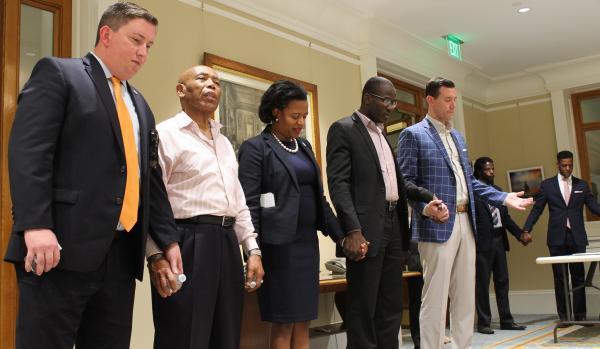May 22, 2017

Haitian community members joined in prayer with lawmakers - including Rep. Dan Cullinane, Sen. Linda Dorcena Forry, and Rep. Daniel Cahill - on Haitian Heritage Day at the State House. Photo: Sam Doran/SHNS
More than 58,000 Haitians living in the United States, including 4,700 in Massachusetts, will have their temporary immigration protections extended for six months, a timeframe some Bay State officials said Monday is not long enough.
Haitian nationals were granted temporary protected status in the United States after a 2010 earthquake, and public health conditions and infrastructure in Haiti have further worsened after destruction caused by Hurricane Matthew and a cholera epidemic.
The protections were set to expire on July 23, and Department of Homeland Security Secretary John Kelly announced a limited extension Monday, citing progress in the Caribbean country.
Senior DHS officials said no decision has been made about whether the program will be terminated for Haitians in January or extended once more, but Kelly said in a statement he believes "there are indications that Haiti - if its recovery from the 2010 earthquake continues at pace - may not warrant further TPS extension past January 2018."
"This six-month extension should allow Haitian TPS recipients living in the United States time to attain travel documents and make other necessary arrangements for their ultimate departure from the United States, and should also provide the Haitian government with the time it needs to prepare for the future repatriation of all current TPS recipients," Kelly said. "We plan to continue to work closely with the Haitian government, including assisting the government in proactively providing travel documents for its citizens."
Massachusetts has the third-largest Haitian population in the United States, after Florida and New York. Haitian pastors, union members and advocates rallied at the State House last week in support of an extension, saying that conditions in Haiti had not improved enough to support an influx of additional residents and that the temporary protected status allows Haitians to work in the U.S. so that they can send money home to help rebuild.
Gov. Charlie Baker called Monday's decision a "positive development."
"Haiti obviously has many issues, and I spoke to Secretary Kelly when he was up here about our concerns about this issue, and the fact that they've put a delay in place I think is a good thing," he told reporters.
Attorney General Maura Healey and state Sen. Linda Dorcena Forry wrote to Kelly earlier this month urging an extension, as did U.S. Sen. Edward Markey.
Forry, a Dorchester Democrat whose parents emigrated from Haiti, told the News Service the six-month extension will not provide enough time for Haitians with temporary protected status to handle their affairs, saying it would take at least a year for someone to get a green card if they had married an American citizen.
"Some have American children now. We have the issue where you are going to be separating families," Forry told the News Service. "Children who are born and raised here, who are American, their parents are going to be kicked out, and where are they going? I think it's just wrong, fundamentally wrong. We are a country of compassion."
She said Haiti "really is not able to sustain 50,000 people coming back in," in large part because of the prevalence of cholera.
Healey said her office would "continue to urge DHS to extend this status until Haiti, hard hit by natural disasters and public health crises, is able to support the return of these individuals and families currently in Massachusetts and across the country."
Markey, in a statement, called the extra six months "a good step" and urged Kelly to add on another year as Haiti continues to rebuild. The maximum length of an extension is 18 months, according to DHS.
"This decision reflects the compassion and generosity of spirit that should be the hallmark of U.S. policy toward Haitians in the United States who are unable to safely return to their homeland," Markey said.
Markey's office cited U.S. Customs and Immigration Service numbers showing that as of 2016 there were 4,735 Haitian TPS recipients living in Massachusetts and a total of 58,706 nationwide.
Temporary protected status is granted in cases of ongoing armed conflict, environmental disaster and other temporary and extraordinary conditions, according to DHS. Haiti was originally designated for TPS in January 2010 after the earthquake, and redesignated in 2011.
Senior DHS officials told reporters that Kelly based his decision on conditions including damage to infrastructure and housing and the status of the cholera epidemic and found that conditions had substantially improved since 2010. They said Haitian government officials expressed interest in seeing TPS recipients returning home, where the job and language skills they've acquired could help facilitate development.
Nine other countries are designated for temporary protected status, and the designations for Sudan and South Sudan are next to expire, coming up in November. DHS officials said Kelly is looking at the program closely as part of an effort to ensure all immigration programs serve the national interest.
Topics:


